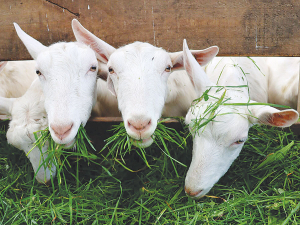Caprine Arthritis Encephalitis (CAE) is a disease of goats caused by a virus.
It is present in many herds throughout New Zealand and tends to develop into clinical disease when goats are under stress, for example in dairy goats kept in relatively intensive conditions.
There is no cure for CAE.
How do goats become infected?
The most common way for infection to spread is from infected does to kids via colostrum or milk.
The milk from one infected doe going into bulk milk can infect all the kids drinking it.
After infection, it can take a long time for the first signs of the disease to appear. In fact, some infected goats show no signs, although they may have reduced productivity, and they can spread the virus to kids and other goats.
What are the signs of CAE?
The clinical disease takes two main forms:
Encephalitis (brain inflammation) is the most common form of the disease in kids.
Signs are first seen at one to four months of age.
Affected kids can be bright and alert but they develop a stilted walk and then become increasingly weak in the back legs until they can’t walk (over a period of 2 weeks to 2 months).
Older goats can sometimes get the nervous form too, and this form of the disease can look like another brain disease – cerebral listeriosis – with aimless circling and a head tilt.
Chronic arthritis is the most common form of the disease in mature goats.
This form of CAE usually develops later – at one to two years of age.
The knees and sometimes other joints swell and the goat becomes lame, often grazing on its knees.
The joint pain and stiffness increase over time.
Again it’s important to distinguish between lameness caused by CAE and lameness caused by other problems such as foot rot.
Occasionally CAE causes mastitis, pneumonia or wasting disease.
Get On To A Vet
If you think you might have affected goats or if you’d like to make sure you don’t have the disease on your farm, the first step is to get your vet to arrange blood tests. Accurate diagnosis is important because there are other diseases that cause very similar signs. Generally, it’s best to repeat testing after a year or so, as some infected goats take some time to give a positive result.
In commercial herds, any test-positive goats should be humanely culled. Then with the help of your vet, there are further steps you can take to get rid of the disease.
Run two herds – one negative and one positive and manage them carefully to prevent infection from spreading from the positive goats to the negative ones.
Prevent spread from blood-test positive does to their kids via the milk by separating the kids from their dams before they suckle and raising them on bovine colostrum and milk substitutes or milk from known CAE-free does.
If you have a CAE-free herd, it’s wise to make sure it stays clear by having a ‘closed herd’ policy. This means that any goats you introduce should be sourced from CAE-free herds, or they should be blood-tested before joining the herd.
Article first appeared on lifestyleblock.co.nz and has been reproduced with permission.










